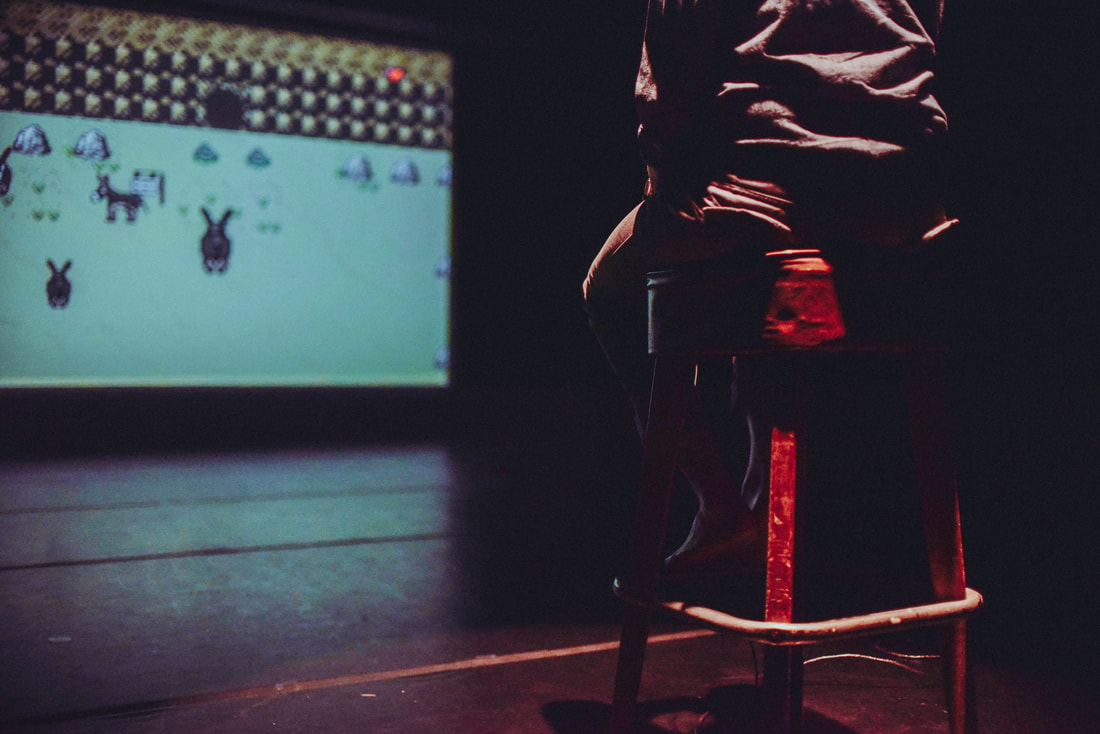asses.masses: a collective audience-player blog (FOLDA 2023)
|
When I left and came back between episodes six and eight, I returned to the theatre to shouting and laughing heard from the Isabel Bader Center lobby. When I opened the studio doors, snacks were sprawled on a table, half eaten fruit trays and a few trays of cookies, and people had relaxed into their seats. The room was vibrant and loud as players shouted “ORB! ORB! ORB! ORB!” to motivate the proxy player Derek along what seemed to be a difficult level. Derek was at the controller playing, floating his “ass” around four puzzles with featured coloured orbs that needed to match up. He was patient but he seemed to be at a bit of a loss on the right answer to the puzzle. The right answer didn’t seem to matter much though, silly hour had begun. While Derek tried and failed and tried again to solve the puzzle, the room seemed more interested in having fun than completing the mini-game. Every time Derek would take a step in the right direction the crowd would begin to chant “ORB! ORB! ORB! ORB!” The vibe in the room reminded me of a sleepover from when I was a kid, when the adrenaline of staying up late with your friends slowly dissolves polite behaviour into loopy chaos. When you laugh so hard you cry but don’t even remember why you’re laughing. When you take off your socks and find yourself sprawling out upside down on the floor. This collective chaos is emblematic to the character that I most associate with when it comes to playing video games growing up. Although both my brother and my best friend would play Super Mario, GTA 5 or Simpsons Road Rage with ease and grace, I was never one to pick up the controller. I was never player one. I’m bad at video games, point blank. I don’t find the controllers intuitive and I’m famous for bumping into the walls instead of making any progress forward. The witness however? That was my position! I would find myself painting my nails and looking up easier paths to success on reddit as my friends played through Super Paper Mario on the WII. I would giggle away in the peanut gallery, bringing snacks and shouting “watch out!” too late to actually help. Watching and laughing along is my preferred mode of video game engagement. More than video games, I’m a big fan of durational experiences. Elsewhere in my phd research, I write about duration in live performance as an abolitionist dramaturgy, a generative and relational practice that uses time as a needle and thread, effectively tying a community together through a sustained experience. I write about how spending an exaggerated amount of time together inside a theatre generates a kind of community, a herd if you will. In the case of asses.masses, the abolitionist dramaturgies are visible. This herd has a very important job to do. To learn their histories and stage a revolution! At one point we even crowdsource a manifesto! In order to achieve these goals, we have to take the time to do so. Beyond simply needing the time to tell this impressively sprawling story, duration has many outcomes in Milton Lim and Patrick Blenkarn’s video game playthrough. Duration allows for participants to settle into this community, to take off their socks and share snacks (at one point, Jenn and I passed a bag of chips around the room!) Duration allows for time to negotiate turn taking and role playing without too much pressure. Duration gave me the time to consider picking up the controller and then ultimately decide against it. Duration gave the hecklers the space and validation that sometimes shouting out ideas is a type of team playing.
Duration also allowed for the sort of chaotic unraveling of our theatrical tendencies. When the show began we were seated in theatre seats and we were certainly all wearing shoes. When I arrived back in the theatre around 10pm, players had fistfulls of spinach dip while they chanted about the orb. As shown in asses.masses, duration has the potential to both generate and destroy. We could grow as a herd while we shed our theatrical tendencies around sitting still and being quiet. We could create community and destroy the passivity of the spectator.
0 Comments
|

 RSS Feed
RSS Feed
